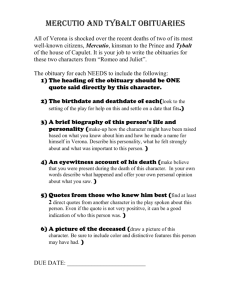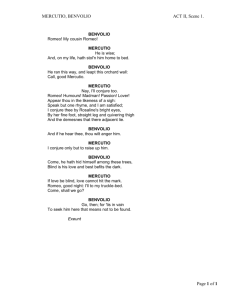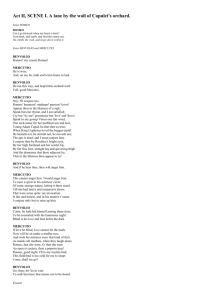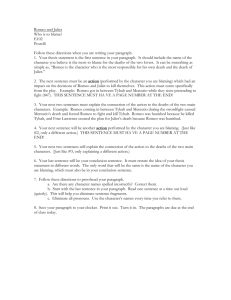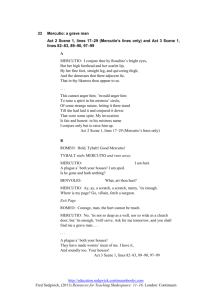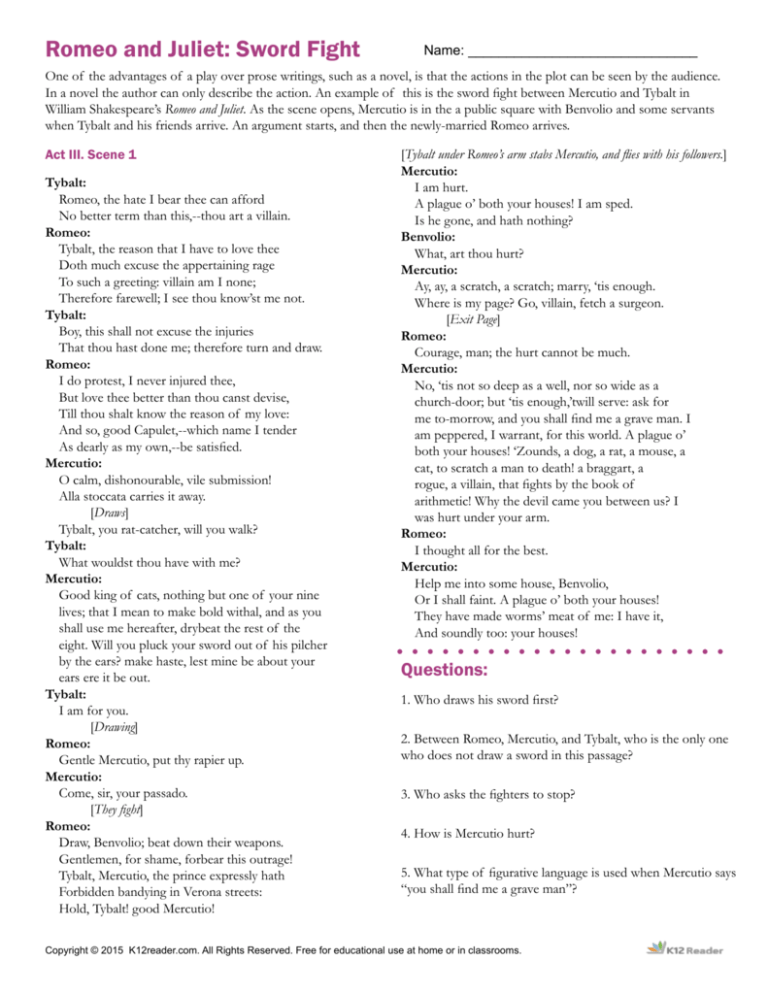
Romeo and Juliet: Sword Fight
Name: ______________________________
One of the advantages of a play over prose writings, such as a novel, is that the actions in the plot can be seen by the audience.
In a novel the author can only describe the action. An example of this is the sword fight between Mercutio and Tybalt in
William Shakespeare’s Romeo and Juliet. As the scene opens, Mercutio is in the a public square with Benvolio and some servants
when Tybalt and his friends arrive. An argument starts, and then the newly-married Romeo arrives.
Act III. Scene 1
Tybalt:
Romeo, the hate I bear thee can afford
No better term than this,--thou art a villain.
Romeo:
Tybalt, the reason that I have to love thee
Doth much excuse the appertaining rage
To such a greeting: villain am I none;
Therefore farewell; I see thou know’st me not.
Tybalt:
Boy, this shall not excuse the injuries
That thou hast done me; therefore turn and draw.
Romeo:
I do protest, I never injured thee,
But love thee better than thou canst devise,
Till thou shalt know the reason of my love:
And so, good Capulet,--which name I tender
As dearly as my own,--be satisfied.
Mercutio:
O calm, dishonourable, vile submission!
Alla stoccata carries it away.
[Draws]
Tybalt, you rat-catcher, will you walk?
Tybalt:
What wouldst thou have with me?
Mercutio:
Good king of cats, nothing but one of your nine
lives; that I mean to make bold withal, and as you
shall use me hereafter, drybeat the rest of the
eight. Will you pluck your sword out of his pilcher
by the ears? make haste, lest mine be about your
ears ere it be out.
Tybalt:
I am for you.
[Drawing]
Romeo:
Gentle Mercutio, put thy rapier up.
Mercutio:
Come, sir, your passado.
[They fight]
Romeo:
Draw, Benvolio; beat down their weapons.
Gentlemen, for shame, forbear this outrage!
Tybalt, Mercutio, the prince expressly hath
Forbidden bandying in Verona streets:
Hold, Tybalt! good Mercutio!
[Tybalt under Romeo’s arm stabs Mercutio, and flies with his followers.]
Mercutio:
I am hurt.
A plague o’ both your houses! I am sped.
Is he gone, and hath nothing?
Benvolio:
What, art thou hurt?
Mercutio:
Ay, ay, a scratch, a scratch; marry, ‘tis enough.
Where is my page? Go, villain, fetch a surgeon.
[Exit Page]
Romeo:
Courage, man; the hurt cannot be much.
Mercutio:
No, ‘tis not so deep as a well, nor so wide as a
church-door; but ‘tis enough,’twill serve: ask for
me to-morrow, and you shall find me a grave man. I
am peppered, I warrant, for this world. A plague o’
both your houses! ‘Zounds, a dog, a rat, a mouse, a
cat, to scratch a man to death! a braggart, a
rogue, a villain, that fights by the book of
arithmetic! Why the devil came you between us? I
was hurt under your arm.
Romeo:
I thought all for the best.
Mercutio:
Help me into some house, Benvolio,
Or I shall faint. A plague o’ both your houses!
They have made worms’ meat of me: I have it,
And soundly too: your houses!
Questions:
1. Who draws his sword first?
2. Between Romeo, Mercutio, and Tybalt, who is the only one
who does not draw a sword in this passage?
3. Who asks the fighters to stop?
4. How is Mercutio hurt?
5. What type of figurative language is used when Mercutio says
“you shall find me a grave man”?
Copyright © 2015 K12reader.com. All Rights Reserved. Free for educational use at home or in classrooms.
Romeo and Juliet: Sword Fight
Name: ______________________________
Key
One of the advantages of a play over prose writings, such as a novel, is that the actions in the plot can be seen by the audience.
In a novel the author can only describe the action. An example of this is the sword fight between Mercutio and Tybalt in
William Shakespeare’s Romeo and Juliet. As the scene opens, Mercutio is in the a public square with Benvolio and some servants
when Tybalt and his friends arrive. An argument starts, and then the newly-married Romeo arrives.
Act III. Scene 1
Tybalt:
Romeo, the hate I bear thee can afford
No better term than this,--thou art a villain.
Romeo:
Tybalt, the reason that I have to love thee
Doth much excuse the appertaining rage
To such a greeting: villain am I none;
Therefore farewell; I see thou know’st me not.
Tybalt:
Boy, this shall not excuse the injuries
That thou hast done me; therefore turn and draw.
Romeo:
I do protest, I never injured thee,
But love thee better than thou canst devise,
Till thou shalt know the reason of my love:
And so, good Capulet,--which name I tender
As dearly as my own,--be satisfied.
Mercutio:
O calm, dishonourable, vile submission!
Alla stoccata carries it away.
[Draws]
Tybalt, you rat-catcher, will you walk?
Tybalt:
What wouldst thou have with me?
Mercutio:
Good king of cats, nothing but one of your nine
lives; that I mean to make bold withal, and as you
shall use me hereafter, drybeat the rest of the
eight. Will you pluck your sword out of his pilcher
by the ears? make haste, lest mine be about your
ears ere it be out.
Tybalt:
I am for you.
[Drawing]
Romeo:
Gentle Mercutio, put thy rapier up.
Mercutio:
Come, sir, your passado.
[They fight]
Romeo:
Draw, Benvolio; beat down their weapons.
Gentlemen, for shame, forbear this outrage!
Tybalt, Mercutio, the prince expressly hath
Forbidden bandying in Verona streets:
Hold, Tybalt! good Mercutio!
[Tybalt under Romeo’s arm stabs Mercutio, and flies with his followers.]
Mercutio:
I am hurt.
A plague o’ both your houses! I am sped.
Is he gone, and hath nothing?
Benvolio:
What, art thou hurt?
Mercutio:
Ay, ay, a scratch, a scratch; marry, ‘tis enough.
Where is my page? Go, villain, fetch a surgeon.
[Exit Page]
Romeo:
Courage, man; the hurt cannot be much.
Mercutio:
No, ‘tis not so deep as a well, nor so wide as a
church-door; but ‘tis enough,’twill serve: ask for
me to-morrow, and you shall find me a grave man. I
am peppered, I warrant, for this world. A plague o’
both your houses! ‘Zounds, a dog, a rat, a mouse, a
cat, to scratch a man to death! a braggart, a
rogue, a villain, that fights by the book of
arithmetic! Why the devil came you between us? I
was hurt under your arm.
Romeo:
I thought all for the best.
Mercutio:
Help me into some house, Benvolio,
Or I shall faint. A plague o’ both your houses!
They have made worms’ meat of me: I have it,
And soundly too: your houses!
Questions:
1. Who draws his sword first?
Mercutio
2. Between Romeo, Mercutio, and Tybalt, who is the only one
who does not draw a sword in this passage?
Romeo
3. Who asks the fighters to stop?
Romeo
4. How is Mercutio hurt?
Tybalt stabs him under Romeo’s arm.
5. What type of figurative language is used when Mercutio says
“you shall find me a grave man”?
a pun
Copyright © 2015 K12reader.com. All Rights Reserved. Free for educational use at home or in classrooms.

